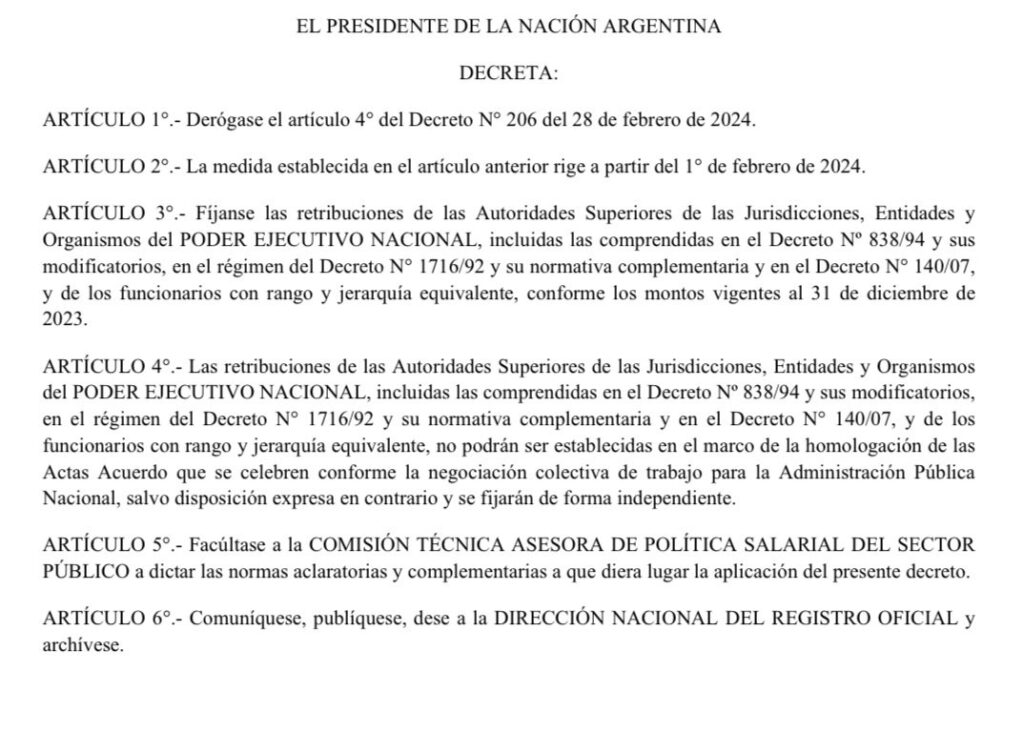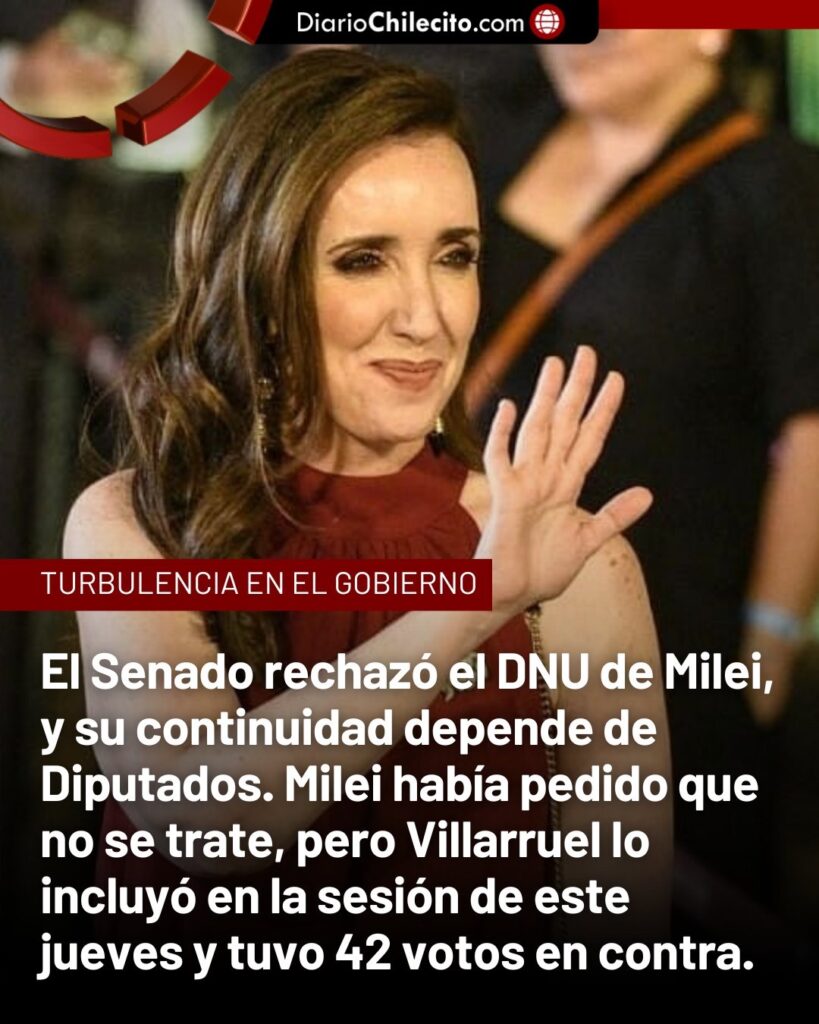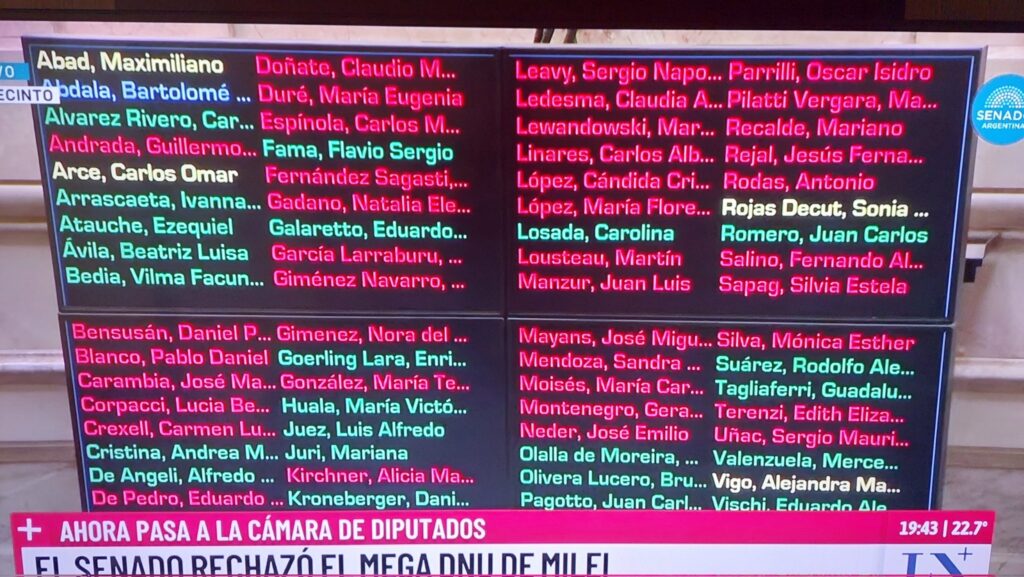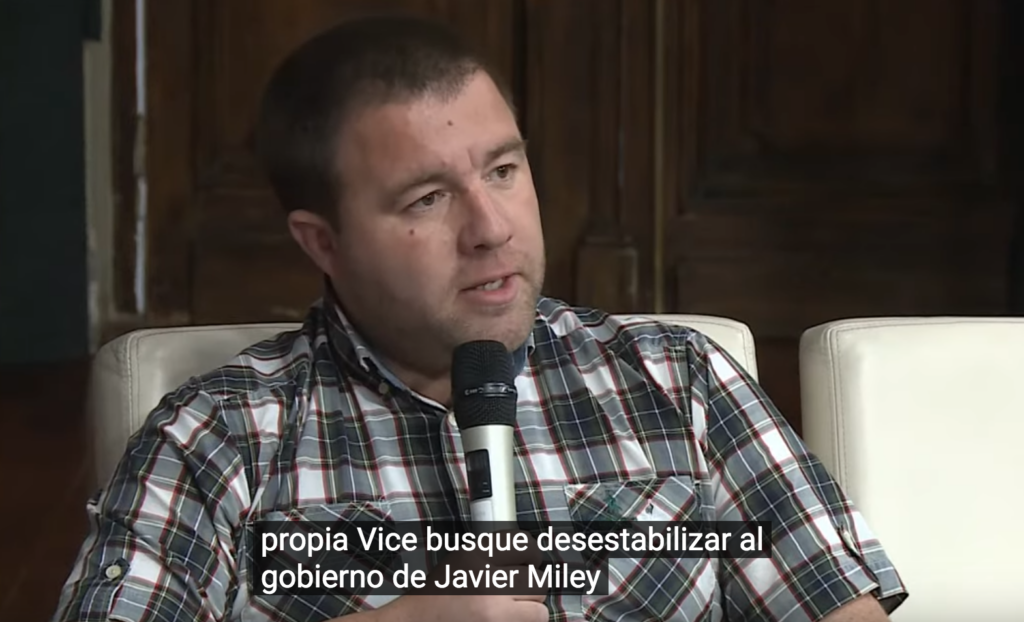
March had started out relatively well for Javier Milei, after a difficult February. It began with his speech to the National Congress and the plan for the “May Pact” in Córdoba on the auspicious date, May 25th. He had also done some arm twisting to bring rebel governors to the table on spending (and whatever else he wanted). But then it was downhill all the way till the Ides of March (March 14th. 2024). All the way there there have been petty little fights between the none too smart and somewhat inexperienced politicians in the LLA. A few days earlier an automatic adjustment had raised Javier Milei’s salary from 2.3 million pesos a month to 4 million a month. This adjustment was not over the top given the inflation in the last three months (73%) but Javi was indignant (again).

First he claimed that the law which gave him the raise (a raise he’s denying other public employees like teachers, who earn about 1/10th of what Javi does) was signed by the Peronists. That was true; former Vice President Christina Fernandez de Kirchner had signed the law many years back, but so what? The law had a timeout cause and Javi himself had signed the extension.
He claimed he didn’t sign anything, then someone showed him the law with his signature. Then he signed another decree (see above) to reverse the pay rise. You see Javi’s whole spiel was that he was controlling the political casta and the cost of his adjustments would not affect the people. Then he gives himself and the rest of the casta a big pay rise. Political suicide.
Javi had to reverse his own pay rise (and that of the rest of the “casta”, everyone in congress and elsewhere in the govt.). Unfortunately that was difficult as everyone had already been paid so the decree added that the pay increase had to be paid back. This did not look good. Heads had to roll. But no narcissist ever blames themselves, so Javi fired his Labour Secretary Omar Yasín .
His woes didn’t end there.

On the 13th of March Villarruel the vice-president wanted to get things started in the Senate. In Argentina the vice president is the boss of the Senate by law. The problem was that Javi’s DNU was still in full force because neither the senate nor congress had been able to question it yet as they were on vacation. The DNU is a hodgepodge of 300 new legislative changes. It is almost universally disliked, except by Javi’s loyalists. This is not because a DNU is necessarily a terrible thing, but a DNU should not be a random shopping list of laws, instead it should address a coherent single theme. Also the (Decree-D) should also be both (N-Necessary), and (U-Urgent), and that is hard to argue, so, as Martin Lousteau (UCR opposition leader) said it’s unconstitutional. The Senate was able to have the DNU tabled for an approval/disapproval vote on the 14th. and the vice-president didn’t block it. Was it that Villarruel thought it would go through, or might it be that maybe she’s stopped being so loyal and caring? The DNU was rejected.

One day before journalists suspected that there might have been a bit of a disagreement between her and Milei, a theory that wasn’t completely discounted by Manuel Adorni the President’s spokesman at his daily press conference on the 13th. On the 14th Adorni was asked again by journalists whether there had been a disagreement between his boss and his other boss. Disagreement abounds. That very morning Adorni had been summoned to the pink-house for Breakfast by Milei. Javi seemed none too happy. Maybe Miguel had been reprimanded by his boss?

Nicolás Gallarda at the Thursday Mar. 14th press conference pressed Adorni about a harsh criticism, made of by Javí’s henchman Espert, as it was not clear whether Villarruel was targeted or the political caste in general. Adorni dissimulated any validity of Espert’s claims that Milei’s government could be destabilised by Villarruel saying that “from what he had read in those last 24 hours” this was a comment directed at the casta. Adorni then interrupted himself awkwardly in his own press conference smiling and asking “I’m not sure I understand why you’re smiling“. Didn’t he get the joke? The implication clearly was that the house of cards seemed to be crumbling. Maybe Adorni might have thought he might be next for the chop. All necks are on the chopping block now maybe even you-know-who. Maybe Villarruel might have the last laugh as happened in Peru recently. The profile piece on the vice-president in the Financial Times quoted an anonymous diplomatic source saying ““I think you have to watch her closely,” adding “She is ready … for anything.”
The DNU, the May Pact, and even legislative shenanigans, all pale into insignificance when compared with the broken economy (as reflected by inflation). This is why Milei, who supposedly knows about Macroeconomics was elected. The electorate voted for Milei because he said he had a plan to fix the economy. That’s it! But the economy is worse and the main reason it’s worse (among many broken aspects of the Argentine economy) is that Javi broke any confidence in the currency to triple inflation to 73% in his government’s first three months. Without austerity legislation his monetarist plan can’t work and with it, it probably won’t anyway. Javi’s days are numbered. He put his trust in Monetarism but he can’t implement it and even if he did with the destabilized currency, it is questionable whether it would work.
Inflation
Monetarism is a theory of the economy based around money supply, hence the name. It was first tried out in the 1970’s in the early days of neoliberalism. At that time the main users were Margaret Thatcher in Britain, and Ronald Reagan in the US. The principal economic theorists were Friedrich Hayek and his mini-me Thomas Friedman; both his heros (but Javi’s more old school Hayekian). These two were monetarism’s main proponents and it’s pioneers, in vogue back in the seventies they both got Nobel Prizes. Friedman also used to visit his mate Pinochet in neighbouring Chile shortly after the latter led a coup d’État killing the elected Socialist President Salvador Allende. When Pinochet took power he installed the Chicago Boys (a reference to Friedman’s University of Chicago faculty) in the Chilean Ministry of Economics. Now a weird paleo version of early-stage Hayekian-Chicago School economists are back in the Southern Cone. Calling themselves libertarians, the clock has come full circle with Milei.
In the seventies Argentina too became a military dictatorship (1976-1983). That Junta lost power when they lost the war when President Leo Galtieri captured a few South Atlantic islands claimed by Britain. In the early 80’s Thatcher’s power in Britain was waning, monetarism there had made her very unpopular so she jumped at the chance of sending the fleet south, calculating correctly that a win in Las Malvinas (a.k.a. The Falklands) would mean she might win another general election in the UK. Thatcher won the war (and the elections) and Argentina won it’s freedom. By losing the war, the Junta’s dictatorship collapsed. Meanwhile in Britain monetarism was causing vast unemployment.
All of this was 40 years back but history repeats itself. After the junta, the UCR, under Alfonsín (Lousteau’s party) won the elections and freed Argentina from the notorious state terror called “The Process of National Reorganization”. El Proceso also left Argentina saddled with debt. This debt was not just from war costs. Rather the debt included money owed abroad by corporations in argentina (denominated in dollars) which had been guaranteed by the dictatorship. This included City Bank for example that went into “debt” to buy a chain of banks in Argentina, debt owed by City Bank to City Bank; generously paid by the Argentine taxpayers. This scheme called La Estatización de la Deuda Privada (taking private debt public) is suspiciously similar to Caputo’s latest fiasco where the currency risks of certain international transactions (debts accumulated on imports now doubled in pesos by his devaluation) were effectively added to the Argentine national debt (being swapped for devaluing bonds in pesos). “Acindar took advantage of the nationalisation of business liabilities, designed by Domingo Felipe Cavallo [with a lot of help from Martinez de Hoz] when he was president of the Central Bank.” Here we go again.
In the early 1980’s, taking private (corporate) debt public was a corrupt scheme which had been designed by the first Minister for Economics under the military junta: José Martínez de Hoz, a prime architect of the coup. José made money for business owners by overstating their international debt, then writing it off on the taxpayers. De Hoz was a large share owner in Acindar, having been its CEO in 1968. Acindar made out like bandits[sic.] having more “international debt”, when compared to the value of the company’s shares, than any other company in the nation (and that was something). What was good for Acindar SA was bad for Argentine taxpayers adding to their external (odious) debt in dollars. The cost of Caputo’s devaluation and the scheme he invented to “save” local capital will have a similar effect on the national debt also.
Happy anniversary International Capital.
Thatcher won the war in Las Malvinas but Monetarism, even in Britain, began to wane with austerity and unemployment for the poor and higher interest rates for everybody. The monetarists believed that the quantity of money within a nation affects the value of the currency and thereby can create internal inflation. They believe that money is a zero sum game. Javi believes this fervently but, in reality, many things cause inflation. In Argentina currency instability is a major factor. In the 1970’s the amount of money created was the main focus of monetarists but modern monetarism is more about inflation rate targeting and measuring expectations on inflation (by asking the private sector). The problem is that the private sector doesn’t control the values of the local currency so they cover their ass with higher prices just in case. They think in dollars, like Javi. None of this is in the primitive theory of libertarianism but it is the reality of an Argentina absent price controls, anti-trust law and, most important, absent a stable currency (something impossible in Argentina with the current emphasis on exports).
Pinochet put monetarism into action in Chile to calm hyperinflation in a dictatorship after his thugs bombed the presidential palace with President Salvador Allende inside. Monetarism has its own way of persuading the poor that extreme austerity will come good in the end. Sometimes it does improve things but usually not for the poor. In Argentina Javi’s scheme hasn’t come good, and it doesn’t seem to be working out that way this time either. Now Argentina needs to wait till the congressional vote on the DNU. If that fails it is back to the drawing board for Javi. It never rains but it pours.

Well… Part of Milei’s campaign “spiel” typical of Right Wing Populists targeting the “establishment” as a principal culprit responsible for the “Pueblo’s” suffering, which Milei has dubbed “La Casta”, and among the populist snake oil was indeed the pitch that the cost / burden of the harsh economic austerity measures to come that he had in mind to deal with the economic crisis, he assured would be borne by “la Casta” – the political establishment, which the starry-eyed faithful believed like all of the populist illusions fed to them. Of course, how this was to be done was never specified.
Any politically astute observer knows that experience has shown that anytime anywhere that the neoliberal recipe of austerity measures applied as a response to economic crisis aways impacts most heavily the lower sectors of society all the while the Capitalist elite continues to make profits.
It’s no surprise Milei initially supported the pay raise considering when as a newly elected congressman he voted in favor of a congressional pay raise, despite his campaign promise to reduce public spending. Typical of politicians he didn’t keep any of his policy campaign promises.
He backed down on this round of pay raises only because of the strong negative reaction it provoked among his flock had gone viral.
To be clear the Kirchners / Kirchnerismo although they played the Left Populist card they were never really Peronistas but rather hijacked Peronismo (a unique hybrid Populism Peron created) invoking it when convenient.
A big part of the problem with the DNU was the intent to legislate by decree to side step Legislative branch where he’s on shaky ground as his party is the 3rd minority, which even with the full backing of Macri’s PRO still cant make quorum. This is why he has stated during post election interviews regarding weak political weight in Congress that he would resort to governing by decree – after all he is an Authoritarian Populist much like CFK is – expecting all institutions to bend to their will.
The long list of items in the DNU and subsequent Omnibus bill seem like efforts to make up for lost time seeing that as a congressman not once did he present any proposed bills and was absent half the time and it shows he never learned how to legislate.
With regards to Villarruel she raised some eyebrows recently in meeting with important political players sparking rumors that she might be laying the groundwork for a possible “coup” deposing Milei via impeachment, as its not unlikely that he could easily overstep his boundaries and he doesn’t have the numbers in congress to defend himself against impeachment which would result in her becoming President. She’s a sharp ambitious political player – she bears keeping an eye on.
Milei’s primary attraction was not solely based on sounding like he had an economic plan for the Krisis that really began latter part of 2011, but portraying the himself as a right wing populist, the hero to rescue the nation from the clutches of the corrupt leftist populists and the economic and moral ruin they caused and true to the populist scam was able to capitalize on the social discontent and frustration that perceived that none of the mainstream politics / politicians on either side of the aisle was up to the task of fixing the economy and also blamed for the crisis. Hence the “outsider” appeal of the Populist.
Who really sold the military Junta on the idea of the State taking on private debt and was the architect of the mechanism to do so was Domingo Cavallo, head of the Central Bank at the time and then stepped down leaving it all set up and ready to go for his successor to do the dirty work. Which he uses to deny he had any part of it. The plan benefited 30 of the top richest families / companies at the time and saddling the State with massive debt, which he did again under Menem and the orchastrated the “Corralito” during the 2001 crisis and banks stole people’s personal savings. Probably one of the worst economic offenders that has plunged the country into debts and crisis who Milei considers to be the best economic minister in the country’s history. To those in the know that opinion speaks volumes about the economic politics of Milei.
That and the fact he’s first and foremost a fanatic disciple of Murray Rothbard his #1 Guru and therefore a Paleo-libertarian. Hayek follows as close second, who also was advised Pinochet on economic matters and also had a hand in drafting Chile’s Constitution rewritten at the time.
For these reasons perhaps Hayek’s stamp on Chile is what has inspired Milei to want to replicate the Chilean model.
However cracks are beginning to appear in the populist veneer revealing his true intentions on serving the Capitalist elite…